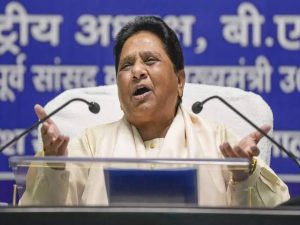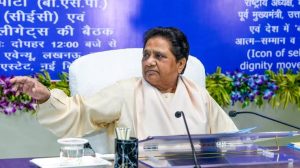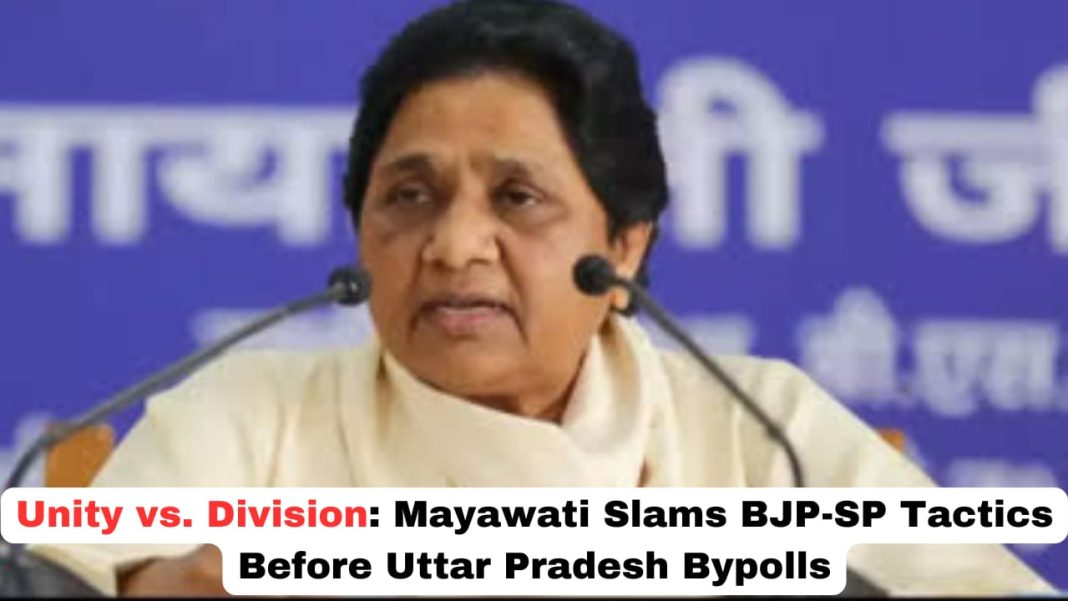Digital News Guru:
Bahujan Samaj Party (BSP) leader Mayawati has recently voiced strong criticism of both the Bharatiya Janata Party (BJP) and the Samajwadi Party (SP) in the run-up to by-elections in Uttar Pradesh. She alleges that the two rival parties are in collusion, working together to mislead voters and manipulate public sentiment for electoral gains. In particular, Mayawati claims that the two parties’ slogans—BJP’s “Batenge toh Katenge” (Divide and Conquer) and SP’s “Judenge toh Jeetenge” (Unite and Win)—are being used to drive divisive tactics that could sway the outcome of the election.
Background on Mayawati’s Criticism
The statement from Mayawati, a former Chief Minister of Uttar Pradesh and a significant force in state politics, has ignited a conversation on the strategies used by political parties to influence voters. Her allegations highlight a perception that the BJP and SP are working in ways that appear confrontational but may actually serve to polarize communities to their advantage. Mayawati’s commentary is particularly directed at how the two parties are promoting narratives that could lead to voter division based on caste, community, and regional lines.
Mayawati’s BSP has traditionally positioned itself as an alternative to the SP and BJP, appealing particularly to the Dalit community and other marginalized groups. Her critique of the two dominant parties may be part of a broader strategy to present the BSP as an independent option in Uttar Pradesh politics—a state where caste and community alliances play a significant role in shaping political dynamics.

A Look at the BJP and SP’s Campaign Strategies
Ahead of these by-elections, the BJP and SP have been pushing contrasting yet resonant slogans aimed at unifying or strengthening their voter bases. The BJP’s slogan, “Batenge toh Katenge,” conveys a strategy aimed at splitting the opposition by appealing to a broad, diverse voter base while fostering support among its traditional Hindu voter bloc. BJP leaders have consistently focused on issues such as national security, development, and Hindutva to consolidate their support among communities across the state.
The SP, on the other hand, is using the slogan “Judenge toh Jeetenge” to signal an inclusive message of unity. The SP seeks to rally groups who may feel alienated by the BJP’s politics and wishes to unite voters under a common cause to challenge the BJP’s dominance. This message of unity focuses on including minority communities and aligning with regional allies, thus aiming to consolidate support from various demographic sections.
The Role of By-Elections in Uttar Pradesh Politics
By-elections in Uttar Pradesh hold particular importance as they serve as a political barometer before the larger state and national elections. These elections offer parties an opportunity to test their appeal among voters, refine strategies, and even forge or dissolve alliances based on voter sentiment. As the country’s most populous state, Uttar Pradesh plays a crucial role in national politics, often setting the tone for broader trends across India. The performance of the BJP, SP, and BSP in these by-elections can significantly impact the political landscape as they seek to either consolidate or expand their influence.

Mayawati’s statements, therefore, are likely calculated to resonate with voters who might feel disenchanted by the tactics of the BJP and SP. She aims to establish the BSP as a party committed to addressing real issues without resorting to divisive strategies.
Understanding the Power Dynamics Between BJP, SP, and BSP
For decades, Uttar Pradesh politics has been characterized by the rivalry between the SP and BSP, each drawing from distinct voter bases. The BSP primarily garners support from Dalits and marginalized groups, while the SP historically appeals to the Yadav and Muslim communities. The BJP has been working to consolidate Hindu voters across caste lines, a strategy that has proven effective in recent elections. Mayawati’s critique of both the BJP and SP suggests that she sees their current approach as a threat not only to her party’s base but also to the social unity within the state.
In recent years, the BJP has successfully gained ground in regions that were previously SP or BSP strongholds, which has made the competition more intense. By framing both the BJP and SP as two sides of the same coin, Mayawati aims to draw disillusioned voters to her side, particularly those who may feel exploited by caste-based politics.
Public Reaction and the Implications for BSP’s Strategy
Mayawati’s critique has received mixed reactions from political analysts and the public. Some see her statements as a strategic attempt to distance the BSP from the traditional caste-based politics of the region, positioning it as a party focused on development and social justice. Others view it as a tactical move to reclaim lost ground and re-establish the BSP as a key player in Uttar Pradesh politics, especially with the approaching general elections.
For the BSP, these by-elections are not just about winning seats but about rebuilding its presence in a state where it has lost influence in recent years. By targeting both the BJP and SP, Mayawati is likely attempting to build a broad coalition of voters who are seeking an alternative to the current polarized political environment.
The Role of Caste and Community Politics
Caste and community politics have long been integral to Uttar Pradesh’s political scene. The BSP, founded by Kanshi Ram and later led by Mayawati, has historically built its support base on the empowerment of Dalits and other marginalized communities. On the other hand, the SP primarily draws support from the Yadav community and Muslims, while the BJP has successfully consolidated support among upper-caste Hindus and other Hindu groups through its Hindutva-driven policies.

Mayawati’s critique points to the risk of entrenched caste dynamics being exploited by both the BJP and SP to control and segment the electorate. According to her, both parties are engaging in campaigns that appeal to specific demographics in ways that reinforce division rather than foster a more inclusive approach to governance. Mayawati’s rhetoric suggests that her focus is on uniting people across caste and community lines under the BSP’s banner, emphasizing socio-economic development and social harmony as priorities over identity-based politics.
Conclusion
Mayawati’s criticism of the BJP and SP highlights the complex dynamics of Uttar Pradesh politics, where alliances, slogans, and campaign strategies can shift voter allegiance and impact electoral outcomes. Her allegations of collusion between the two parties underscore a significant challenge in the political landscape—where voter perception and narratives of division or unity play powerful roles.
As the by-elections approach, it remains to be seen how effective Mayawati’s message will be in attracting voters. Her strategy of framing the BSP as a non-partisan, development-focused alternative could resonate with those frustrated by polarized politics. However, in a region deeply influenced by caste and community affiliations, the BSP’s success will depend on whether it can genuinely reposition itself as a party that transcends these divides while still appealing to its traditional support base.
You May Also Read: Delhi’s Air Quality Shifts from “Very Poor” to “Poor” Following Diwali








